Q&A: Writer Ed Brubaker on Making Crime Pay (While Protecting Your Voice in Comic Books and Hollywood) - Part 2
After twenty years as a bestselling and award-winning comic book creator, the writer discovered he still had a lot to learn…from TV writers’ rooms, of all places
I can’t imagine there are many people in the world who would argue with the assertion that Ed Brubaker is one of the greatest comic book writers of all time. For a quarter-century, his work on creator-owned crime comic books and superhero series has inspired readers, influenced countless artists, and produced characters and storylines so significant they’ve helped build cinematic franchises. But starting in the aughts, the writer set his sights on conquering Hollywood, too. By 2016, he had landed in the writers’ room of “WESTWORLD” and co-wrote Episode 4 of its first season. While still on the show, DRIVE director Nicolas Winding Refn came calling and asked Ed to write a film for him, an opportunity that evolved into the seedy modern noir “TOO OLD TO DIE YOUNG”. These opportunities didn’t come without challenges for him, as you’ll see. Today, he’s the head writer of the upcoming “BATMAN: CAPED CRUSADER” series and is co-showrunning an adaption of his seminal comic book series CRIMINAL.
In Part 1 of my conversation with Ed — which you can read here — we discussed how he developed his unique voice and his comic book journey. In Part 2, we transition from comics to Hollywood. You’re going to get a front-row seat of what this experience has been like for him and what he’s learned from it, which will hopefully better prepare for it when your time comes. Again and again we will return to a question that defined our chat:
How do you find your creative voice given all the professional considerations that can get in your head — especially when it comes to Hollywood — and then, once you do, how do you protect it?
CH: Let’s talk about Hollywood because “WESTWORLD” wasn’t your first foray into film/TV industry. You created the Crackle series “ANGEL OF DEATH”, which debuted in 2009 and starred the amazing Zoë Bell. Very fun and very on-brand for you. From my experience, almost anyone anywhere who took the time to imagine being a storyteller also imagined one day becoming a Hollywood screenwriter. Was it always a lurking ambition of yours?
EB: Yeah, for sure. My uncle was John Paxton, who wrote MURDER, MY SWEET and ON THE BEACH, and THE WILD ONE, and many other movies, so that was always in my mind, that a person could do that for a career. But he died when I was in high school, and at that point comics seemed like the big thing I wanted most, so I just tenaciously followed that path. But from, like, 2000 on, I was making trips to L.A. and starting to write movie scripts - that didn’t get made. It was only after seeing “BREAKING BAD” that I started thinking about writing for television, though. I mainly wanted to work in film, originally. That show was like a revelation, that you could do the kind of things I wanted to write on television actually.
“Being in a TV writers’ room was a huge culture shock for someone like me, who’d already spent twenty years writing for a living.”
CH: How did you initially find the experience of working in television compared to comic books? Was there any culture shock for you?
EB: Oh, fuck yes. I mean, doing pilots and screenplays, depending on the job or the producers involved, is not dramatically different than writing comics. On a technical level, it’s a different kind of writing, but you’re still describing things and then writing dialog or narration. It’s a learning curve to get used to it, but mostly you’re still on your own, writing, and then you turn it in, get some notes and do a polish - or ten, if it’s a movie. But being in a TV writers’ room was a huge culture shock for someone like me, who’d already spent twenty years writing for a living.
CH: Walk me through how.

EB: Those first weeks I spoke up too often, pitched too many ideas, was too excited about it all. But after a month or so I got a better sense of how it worked. You’re all — the writing staff — there to listen to the showrunners and what they are trying to build, and then you try to help them achieve their goals. Maybe you will get to add some of your own ideas as it goes along — or maybe not and that’s the job too — but you’re a team and the showrunners are your captains sort of, and you’re trying to help them execute their idea, their vision. Not yours.
CH: How did you handle that after so many years as the captain of your own ship?
EB: I won’t lie, that was very hard. I’m good at helping friends kick ideas around, and I like it, actually almost all my best friends are writers and some of my happiest times are on the phone with them or walking around talking about whatever we’re working on and helping each other -but it’s not the same, you know? I need the satisfaction of writing something where I get to make the decisions. Helping someone else write a story doesn’t give you the same feeling inside as writing your own story – and I’m not saying that as a complaint.
CH: No, no, I understand, trust me.
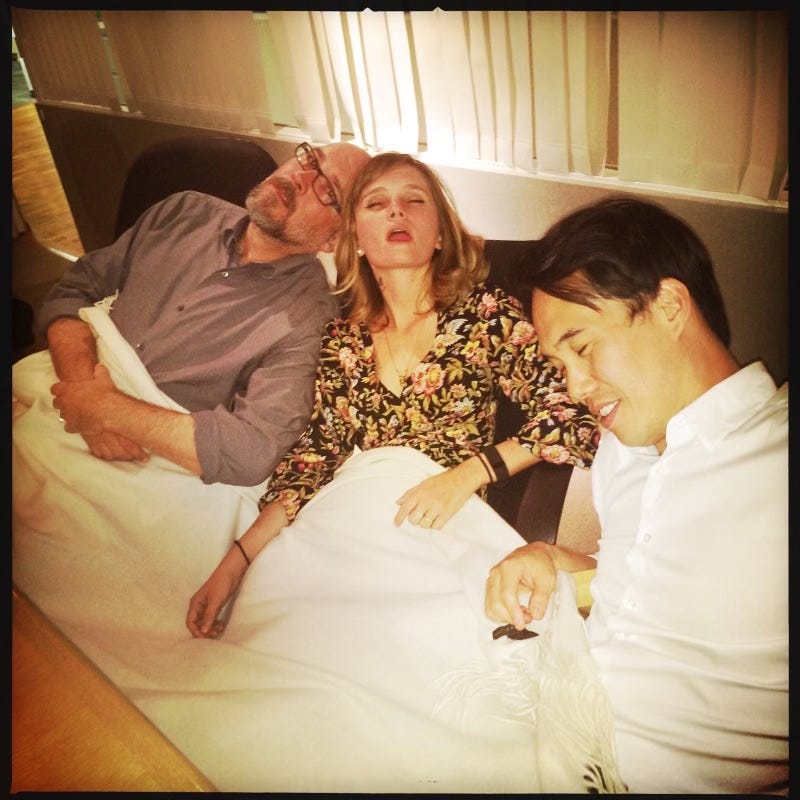
EB: “WESTWORLD” was life-changing for me. I learned a ton and I met my best friend in that room. It's a great job, being in a room full of other talented people kicking ideas around, but it is often a hard job, too, where many writers wish they could just be writing. So, I try to keep that in mind when I’m working in TV now. I think writers are happiest when they can write, not just talk about writing. Not everyone loves writing out loud, you know? I’m not the biggest fan of it myself, really. So, for my writer’s rooms, I try to keep the hours short and remind everyone in them to keep focusing on their own work at the same time. Because I want them to be happy and I want them to develop or continue to develop their own voices as writers.
“It's a great job, being in a room full of other talented people kicking ideas around, but it is often a hard job, too, where many writers wish they could just be writing.”
CH: I’m going to come back to how writers develop but also protect their voices in Hollywood in just a moment, but first I want to ask about “TOO OLD TO DIE YOUNG” in the context of this conversation about your life in film/TV. I didn’t feel it got nearly as much attention as it deserved, but I certainly enjoyed it. It felt like what I wanted out of an Ed Brubaker series in so many ways. You co-created it with Nicolas Winding Refn – I’m not going to bring up how jealous I am you’ve worked with him – and you co-wrote almost every episode. In an industry where whatever is special about us is diluted by the time the product, so to say, is delivered to the consumer, how did you find the creative process and the experience?
EB: A rollercoaster. Some good, some bad, lots of learning. It’s a long answer, but one of the reasons I moved to L.A. was because I got an early copy of DRIVE and was so angry that I hadn’t made it, that I just wanted to work with Refn more than anything. And somehow, I made that happen.
CH: You’ve got to tell me how.
EB: I started out writing a movie script for him, a remake of MANIAC COP, where he and I worked pretty closely on the outline. I’d write stuff up and go meet with him at, like, midnight after his kids were asleep, and we’d sit out back and talk it all through, and it was a lot of fun. And then I wrote a bunch of drafts of the script.
Then at some point, he brought me the initial idea for “TOO OLD TO DIE YOUNG” and asked me to be the co-creator of it with him. He had the name and the idea of doing something like the PUSHER movies, but as a ten-episode miniseries instead and set in L.A., about a weird fictional underground in Los Angeles, which I was obviously down for.
CH: Yeah, sounds like the kind of thing you were born to write.
EB: Totally.
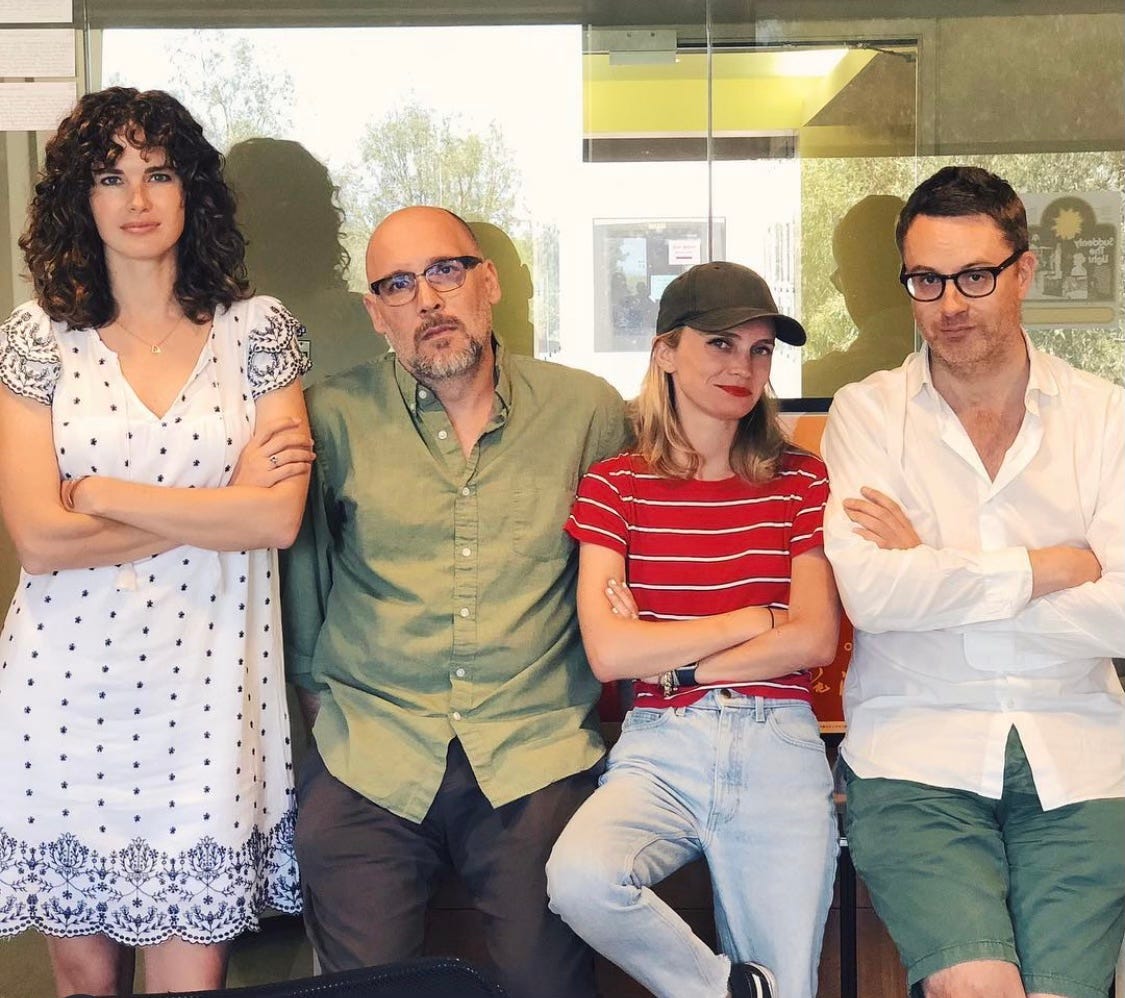
EB (cont’d): Originally it was ten sixty to ninety-minute episodes in a shared world but each starring a different character. But it evolved into just being about Martin and Jesus and Yaritza, mostly. We wrote the pilot together. Like, we’d meet and break a bunch of scenes, then I’d go off and write them up and we’d meet again and go over changes. Or Refn would come up with something nuts and improvise some monologue and then I’d look through the notes later and turn that into dialog. It was a lot of work. I started it while working on “WESTWORLD”, actually, even.
Then, Refn gave the pilot to the guy that used to run Amazon and he greenlit the show two days later, I think? And before the deal was even done, we’d written the next two scripts – episode 2, all set in Mexico, was originally like one-hundred pages long. And some of that was hard, some was fun. It was a lot of pressure, a lot of late nights and rewriting.
CH: I can imagine.
“We all started to lose our minds at some point. I remember one night in the writers’ room me and Halley looking at each other as Nic was rearranging cards on the wall, both of us so exhausted and she whispered to me, ‘We’re gonna die in this room.’”
EB: At some point [Alejandro] Jodorowsky gave Nic a tarot reading and Nic called me and was, like, “The cards say we must bring a female voice into the project” - which is the most Nicolas Refn thing ever to say.
CH: Holy shit, that’s fucking amazing.
EB: So, then we hired my friend, Halley Gross, who was also writing the second LAST OF US game then. And from that point on, we were pushing forward and backward at the same time. Me and Halley just writing and endlessly rewriting the scripts and meeting with Nic at the production office in the early mornings or late nights all the way through shooting.
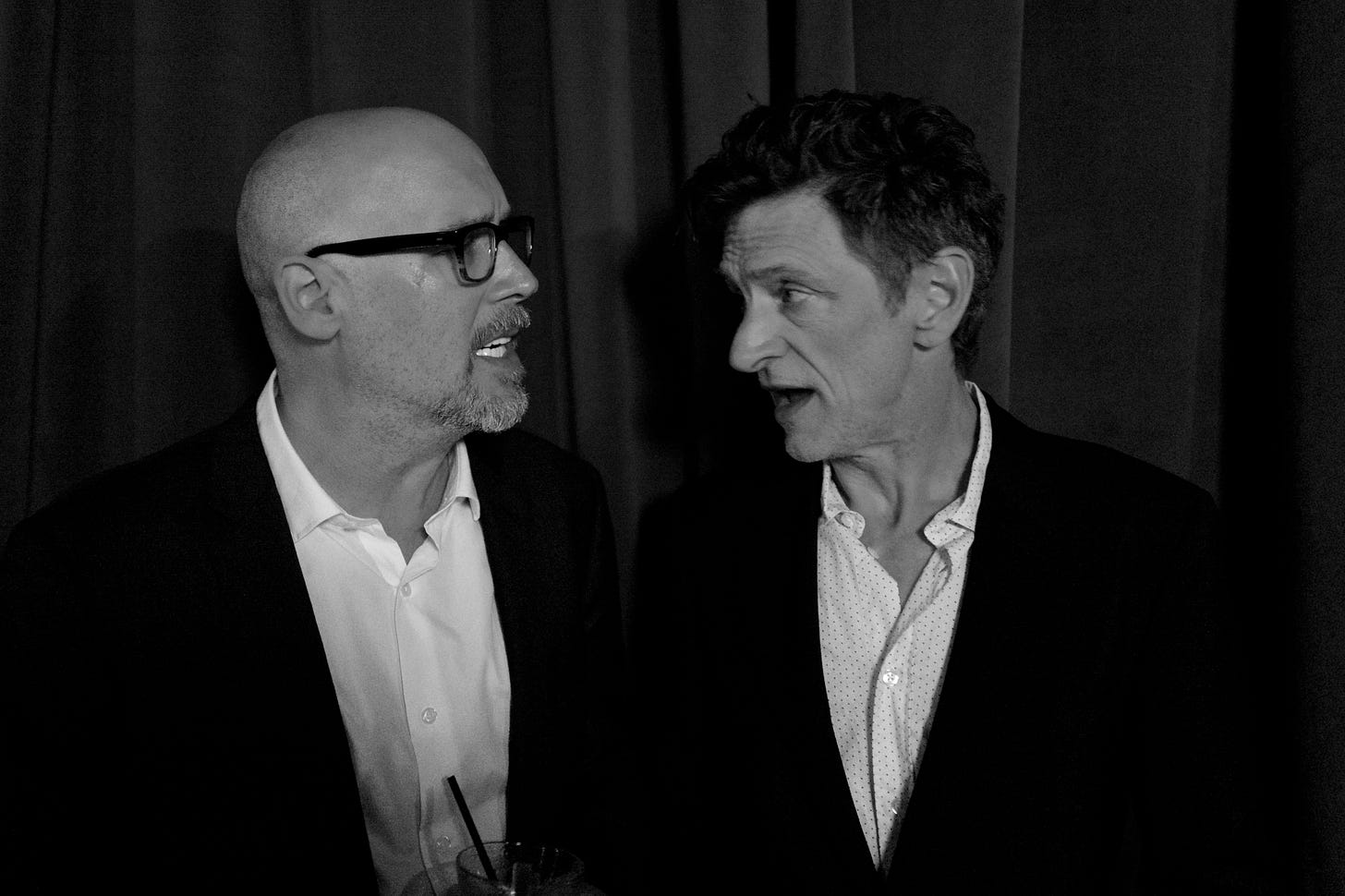
CH: How long was the shoot?
EB: Ten months, and Nic used the week off between episodes to do reshoots on the pilot or other episodes, so we were working twelve hours a day for almost a year, for Nic more like sixteen hours a day. We all started to lose our minds at some point. I remember one night in the writers’ room me and Halley looking at each other as Nic was rearranging cards on the wall, both of us so exhausted and she whispered to me, “We’re gonna die in this room.” And I started laughing so hard I had to put my head on the table.
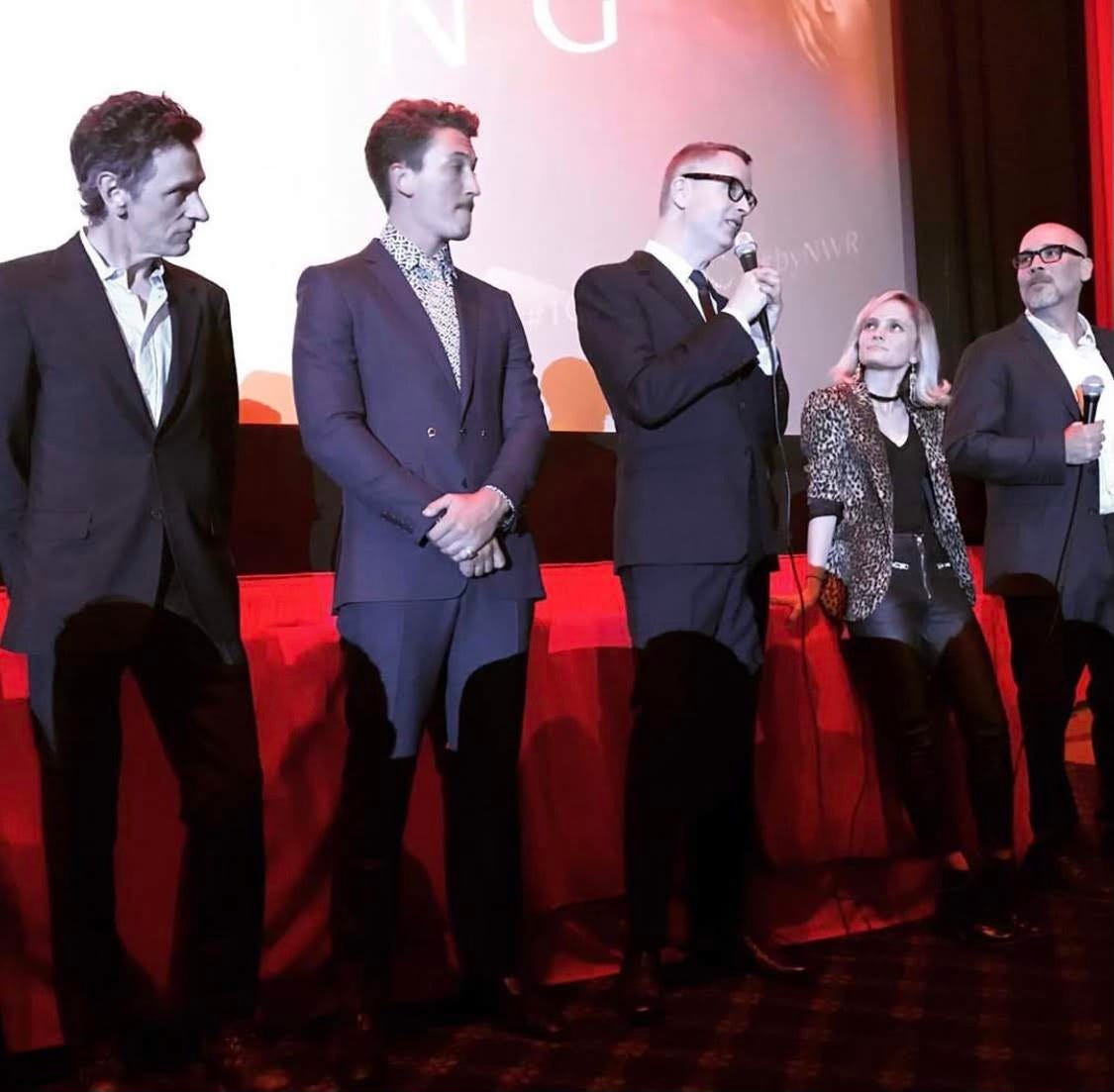
EB (cont’d): But look, the end result is a beautiful and ugly work of art that is very much Refn. With some of me in there, and some of Halley - that’s her voice on the recording Jenna’s listening to in the last episode, actually. And in some ways, I think it was ahead of its time. By the end of it, I felt like I’d been through a war or something. But I wouldn’t trade that experience for anything. Nic is crazy, but a lot of fun most of the time. I even loosely based a character on him in my recent book, NIGHT FEVER. And I met a lot of other great people on that job. In a way, it was like film school. And I no longer fear rewrites or notes, I just don’t want them usually.
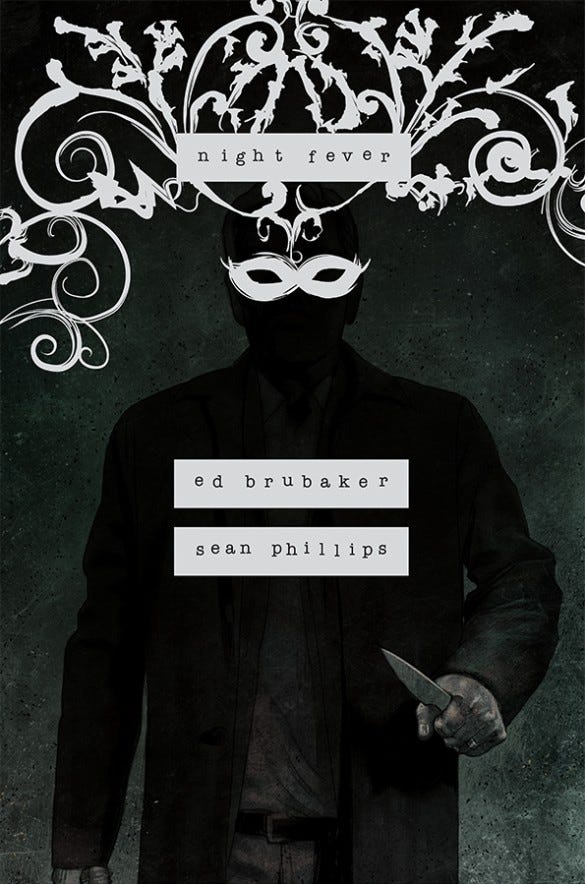
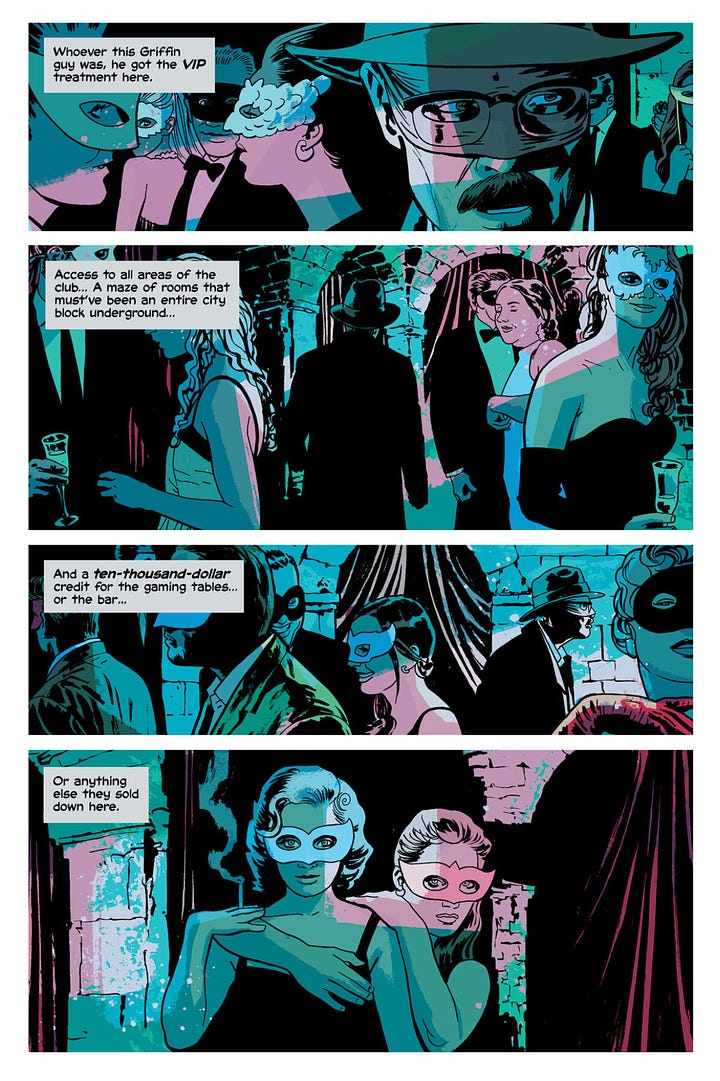
CH: Then I imagine your experience running the room for “BATMAN: CAPED CRUSADER” was child’s play by comparison?
EB: I’m not sure I’d say “child’s play”, but nothing can ever be as hard as that year, writing-wise.
That Batman job came about in a funny way, because I’d called Bruce Timm up to ask about freelancing an episode. I love his work, especially the “BATMAN: THE ANIMATED SERIES” stuff from the early nineties. I think those cartoons actually helped me figure out how to write superhero comics in a way – and they’re super fucked up at times. Like there’s an episode where Batman gets drugged and hallucinates his parents walking into a tunnel and the tunnel turns into a gun barrel and it fires and then blood pours out of the barrel as he screams. That still haunts me. So it was kind of a pipe dream of mine to write one, and then Bruce talked me into being what they call the Head Writer in animation. Which is basically like co-showrunner, but just focused on the writing side, while he and James Tucker oversee the entire show.
CH: How did the writers’ room work?
EB: That was a Zoom room, which was shorter hours, but really story-focused. Just a small group of fun people breaking the first season with Bruce and James. It moved very fast, really, because it’s animation and the production time takes forever compared to live action. It was a great learning experience, and I even got to make it feel a bit GOTHAM CENTRAL-y at times. But I will say, Bruce and James’s vision for the show, which is much more noir than the old one, really appealed to me - it’s PG at least, if not PG-13. This is him taking a big swing, so it was fun to be part of it. The writing staff were all very excited to be doing something the kids in our lives would be able to watch actually, too.
“For my writer’s rooms, I try to keep the hours short and remind everyone in them to keep focusing on their own work at the same time. Because I want them to be happy and I want them to develop or continue to develop their own voices as writers.”
That job was a great reset for me, honestly. I’d come off a few years of being paid for stuff that wasn’t selling and needed to just work on something that was getting made. And I learned more about overseeing other writers and found a way to do the job without it feeling like so much pressure. It turned out to be exactly what I needed.
And then [Warner Bros. Discover CEO David] Zazlav booted us off HBOMax and we had to sell the show to Amazon, but that’s the business right now. At least we didn’t get cancelled. They never stopped production, which would have been a tragedy. We got lucky.
CH: And since that, you’ve done another writers’ room, for an adaptation of your “CRIMINAL” comic book, right?
EB: Yeah, most of the time I was working on the Batman show, I was in negotiations with Amazon for a deal to develop some of me and Sean’s books into shows and movies for them. So I went right from Batman into the “CRIMINAL” room, which I was lucky enough to get Jordan Harper to co-showrun. Jordan is an amazing crime writer. We really speak the same language, and we assembled a murderers row of talent in our writers room. We worked about twelve weeks until the strike, but now we’re just in a holding pattern.
EB (cont’d): It’s been the best experience I’ve ever had in television, I’m sure partly because I have such an emotional stake in the show. But also the people in the room are just the best. That’s the thing I’ve taken from all these jobs, the people in the room with you, working alongside you are what makes it fun and survivable – because TV is an insane job. But it’s also like running away to the circus and finding out that’s where all your people are.
CH: I love that description, man. Returning to the subject of the writer’s voice. Hollywood has a way of polluting how you tell stories, even how you think about them. Executives get in your head, or your agents, or even other writers in a room. You think endlessly about how to establish yourself, then how to maintain your career and income, then how to somehow escape from whatever box they’ve put you in. Tell me what that’s been like for you, and what do you tell writers who are trying to develop and protect their own?
EB: Oh man, that’s a big question. I’ve been doing this a long time, but I can clearly remember the first time Hollywood got into my head. Sean and I had a comic called INCOGNITO come out and it was kind of a hot property when just the first issue was out. A couple different studios were after it — it’s about a supervillain in witness protection — and I was still writing the final third of the story as this was all going on. I don’t know if I did it intentionally, but the last act gets so much bigger than our stuff usually is - and I feel like that was a mistake. I was trying to give them a Hollywood ending or something. The book came out fine and people like it, but I look back and wish I’d made a few decisions differently.
“The thing I learned early on “WESTWORLD” was that I needed to keep doing my own work in the mornings, before going into the office. Like, if I didn’t have my comics to write in the mornings, I’d have gone insane, I think.”
CH: How did things go once you broke into television yourself?
EB: After that, I wrote some TV pilots and on some I had really good execs that had helpful notes and I was happy with the results, even if the shows didn’t go forward, and on another one I was just endlessly frustrated by the back-and-forth notes and changes from the studio. All around that, I still wrote my comic - in fact, back then I was writing four a month probably for Marvel, so I don’t think that process changed me or fucked my head up.
It was really only after starting to do writers’ rooms and being in production or development for long periods of time that I think it messed me up sometimes. Like, I’d wrap from a show and not be able to write for a month or two, or I’d try and not trust my own instincts. It was like that at the end of “TOO OLD TO DIE YOUNG”, too. I just wanted to lie down for a year. But coming off “WESTWORLD”, I struggled to figure out what I wanted or needed to write and, for a while, I’d write a scene and be like, “Is this good even?” But eventually that went away.
CH: Have you developed any tricks to deal with this? I experience something similar myself coming off big projects. It’s almost like I need to creatively hibernate to recover.
EB: The thing I learned early on “WESTWORLD” was that I needed to keep doing my own work in the mornings, before going into the office. That helped keep me steady, to just keep pushing forward on a story every day. Like, if I didn’t have my comics to write in the mornings, I’d have gone insane, I think. I think I’d have just boiled over in frustration waiting for permission to write. But lucky for me, I had this other creative field I’d spent half my life working in.
EB (cont’d): That’s the main advice I give other writers, is not to wait for someone else to give you permission to write. Because then, it just feels like a job. It’s just technical work. It’s the Hollywood dilemma, right? We can all think of ideas that we think might be big hits, but are they something you actually want to write? Because you can find yourself sitting there writing a show you hate, and the money won’t make you hate the job any less.
CH: Speaking from personal experience on “DRACULA” — which we’ve talked about a bit — the money doesn’t help in the slightest.
EB: I mean, thinking about it, that’s probably a good way to start to find your voice in Hollywood, to know what you don’t want to write - even for a million dollars. But yeah, the way the industry works is often hard on writers, and you’re often paid to write like your showrunner, so you can totally get lost in that. You lose the ability to trust your own instincts or give in to studio notes too easily because most writers hate confrontation. It’s all a learning process, but as with everything, you have to listen to your gut. Did you just agree to hire an actor and then feel sick about it? Probably the wrong decision. Did you just agree to staff on a sci-fi show but you really want to write horror and now you’re miserable? Don’t do that again.
But really, if you want to write your own stories, just write them, and use that same instinct you have when anyone else in the room pitches a bad idea or a good idea, and turn it on yourself. You don’t need some executive telling you to move forward. Just write.
CH: I’ve had far too much fun talking with you, but as they say about all good things. I’m going to conclude with a kind of question that I typically begin these conversations with now that we’ve taken this epic stroll through your life and career: What does writing mean to you today?
EB: It’s too big to put my arms around. It’s one of the most important things in the world to me. I couldn’t live without it. And I’m sure I’ll be writing until I’m on my deathbed, whether AI has replaced us all or not, I do not give a fuck, this is what I do.
If this article added anything to your life but you’re not up for a paid subscription, please consider buying me a “coffee” so I can keep as much of this newsletter free as possible for the dreamers who couldn’t afford it otherwise.
My debut novel PSALMS FOR THE END OF THE WORLD is out now from Headline Books, Hachette Australia, and more. You can order it here wherever you are in the world:

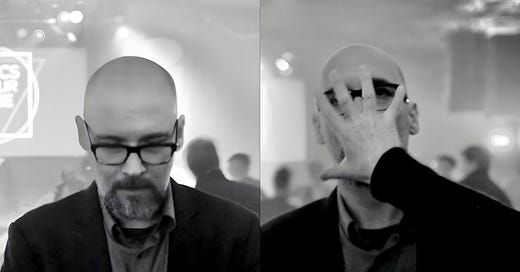



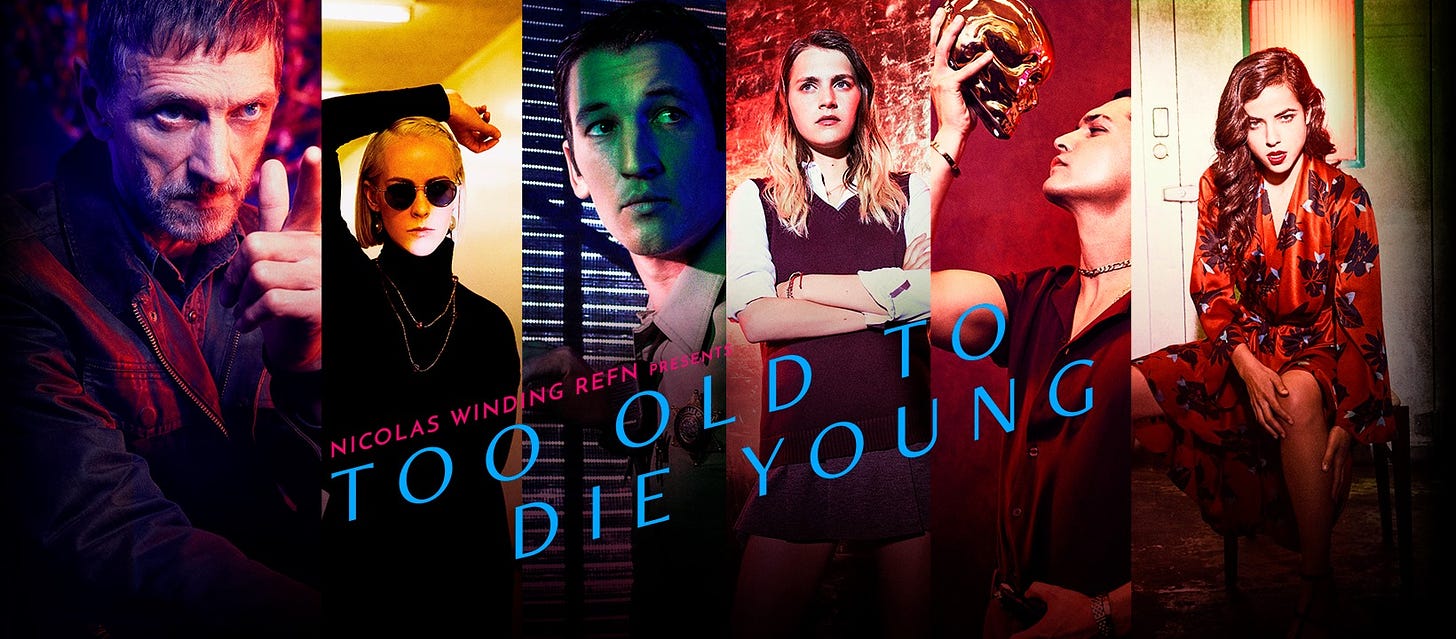
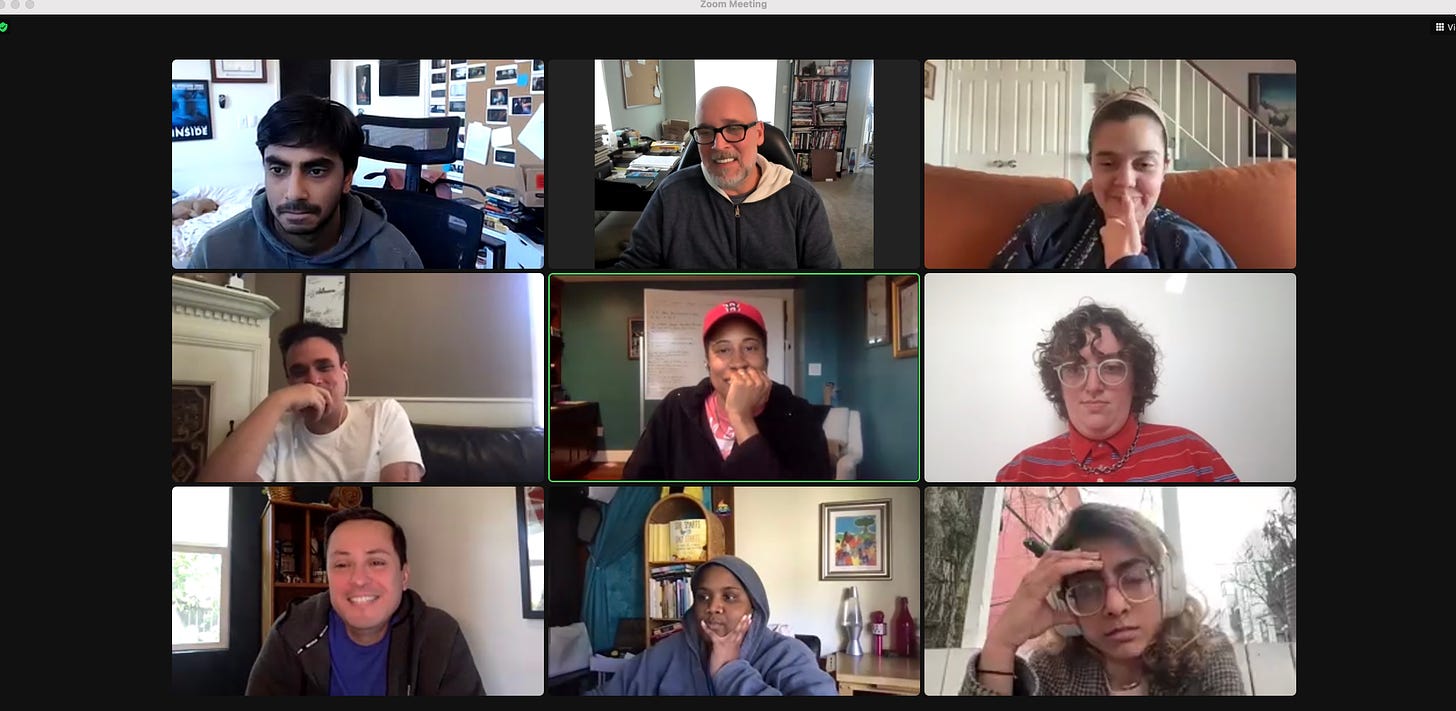
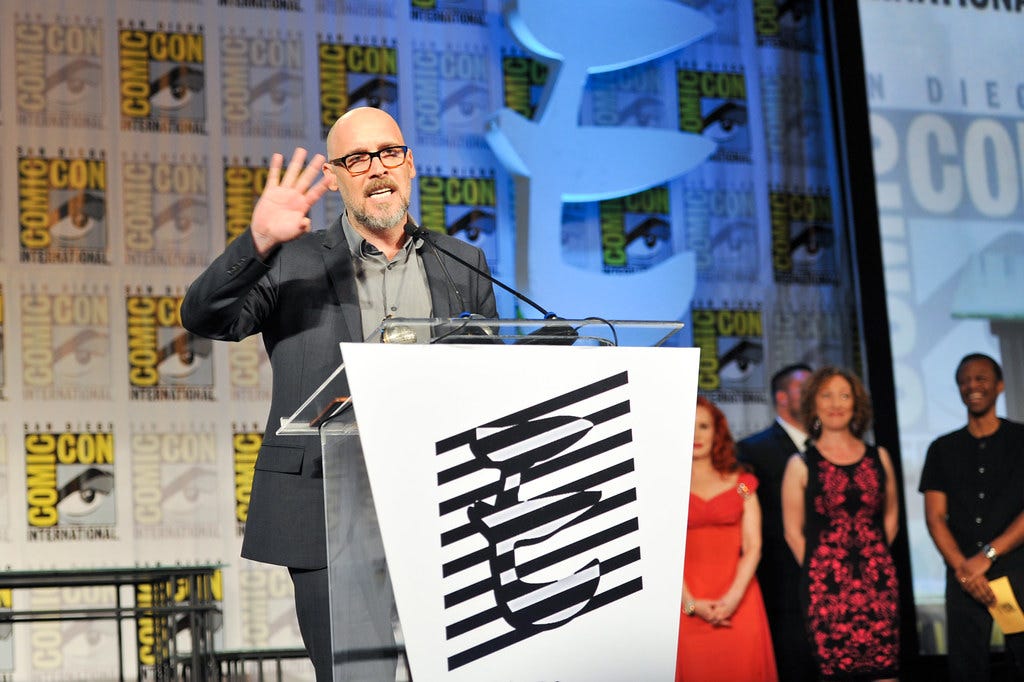

This was wonderful, thank you so much
I've been really enjoying the interviews you have been putting together. I enjoyed part one so much, i finally subscribed! Looking forward to more, and digging through what I've missed. Thank you for these conversations. 🖤